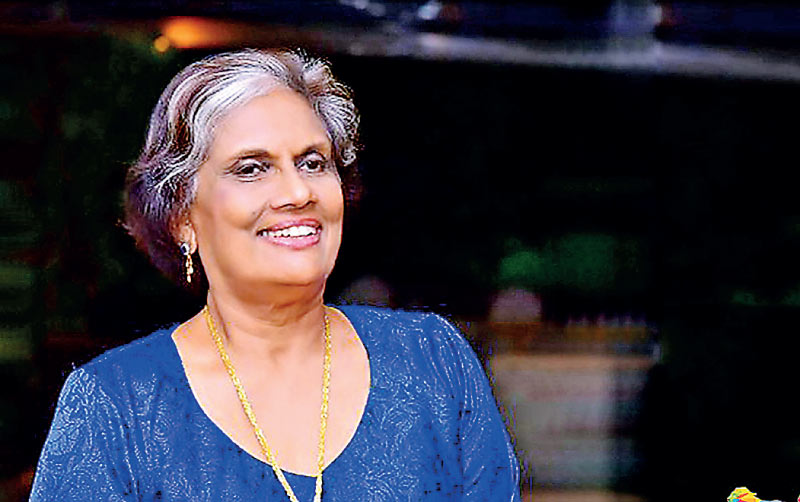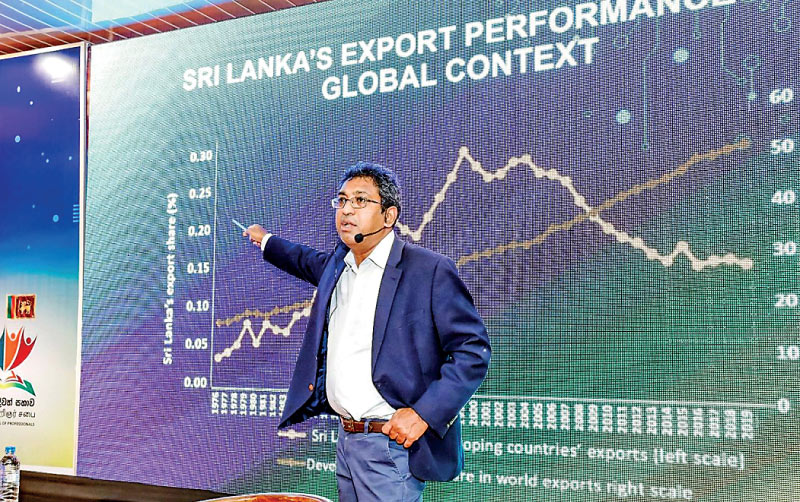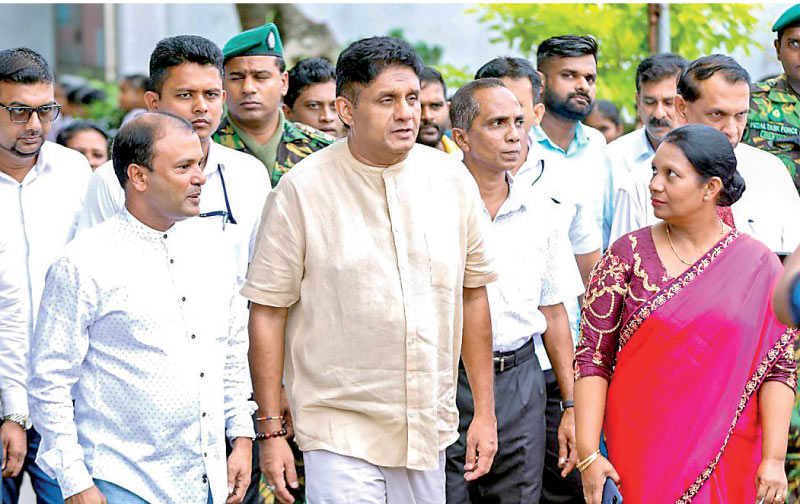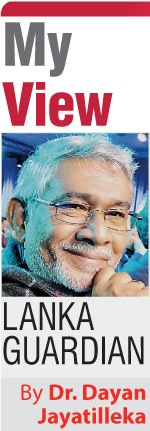Tuesday Feb 17, 2026
Tuesday Feb 17, 2026
Thursday, 28 December 2023 00:30 - - {{hitsCtrl.values.hits}}

CBK: Socialist femme fatale?

Rightwing economic ideologue

Which policy direction?
“This whole inward looking, statist, socialist ideology has existed ever since the assassination of President Premadasa. In 1994, the Chandrika-JVP alliance started doling out jobs, starting more loss-making state-owned enterprises, cutting taxes, giving tax breaks, not focusing on exports, taking money from all kinds of people and building useless infrastructure projects, getting further and further into debt…From 1994 onwards there was a change in ideology…”
– Dr. Harsha de Silva
 As a political scientist I regard the evolution, transformation and development of the JVP, which includes the growth of its broad Movement the NPP, as a tribute to the capacity of Sri Lanka’s democratic system. In this unprecedented crisis, our long-standing democratic system has processed and produced a new national option: a pluralist, democratic Left alternative which has the potential to fill the vacant social democratic space. It must be welcomed, encouraged and critically supported.
As a political scientist I regard the evolution, transformation and development of the JVP, which includes the growth of its broad Movement the NPP, as a tribute to the capacity of Sri Lanka’s democratic system. In this unprecedented crisis, our long-standing democratic system has processed and produced a new national option: a pluralist, democratic Left alternative which has the potential to fill the vacant social democratic space. It must be welcomed, encouraged and critically supported.
However, the Establishment, the collective Right—UNP, SLPP, SJB—is reacting hysterically.
The JVP-NPP’s view “is backward extreme Communism!” an SJB lawyer and former UNP Deputy Minister aggressively, repeatedly admonishes a young NPP spokesperson on a TV panel discussion. “How can the same JVP which destroyed infrastructure in 1988-89, develop the economy today?” shrieks a senior SJB politician.
By the same logic, two counter-questions occur to me:
 How can the UNP (including loyal UNPers until 3 years ago) which permitted and participated in Black July 1983, banned the JVP, and caused two civil wars thereby wrecking the economy, develop the economy today?
How can the UNP (including loyal UNPers until 3 years ago) which permitted and participated in Black July 1983, banned the JVP, and caused two civil wars thereby wrecking the economy, develop the economy today?
 Why did President Premadasa publicly offer Rohana Wijeweera’s JVP three Cabinet portfolios precisely in 1989? If the JVP leadership had the Realism and political maturity to accept, they would’ve been in Premadasa’s Cabinet, however “extreme Communist” their views and violently destructive their practice until then.
Why did President Premadasa publicly offer Rohana Wijeweera’s JVP three Cabinet portfolios precisely in 1989? If the JVP leadership had the Realism and political maturity to accept, they would’ve been in Premadasa’s Cabinet, however “extreme Communist” their views and violently destructive their practice until then.
Policy or ideology?
Ideology is being reinjected into economics, pumping toxicity into the realm of policy, not by the leftwing JVP-NPP but rather by Dr. Harsha de Silva, recently proclaimed by the Opposition Leader as the one who will present the Budget next year. On December 21st 2023, Harsha declared on X:
 “Countless inquiries about our vision for Sri Lanka with SJB, and here’s the answer. Our roadmap for a future government is geared towards reviving Sri Lanka’s economic engine and igniting essential growth for Lanka”.
“Countless inquiries about our vision for Sri Lanka with SJB, and here’s the answer. Our roadmap for a future government is geared towards reviving Sri Lanka’s economic engine and igniting essential growth for Lanka”.
Harsha does NOT say ‘inclusive growth’ or ‘growth with equity’, but merely ‘growth’, which puts him way behind the global consensus in economics from the White House to the family of UN agencies.
Harsha’s X contains a video clip from a recent TV interview which summarizes his ideas. Here are highlights:
 “…The socialist agenda has ruined this country…We have gotten used to handouts by the state. That has to change…If the people see that the government has an ideology and a team that can work with the rest of the world…It has to take its course. We have to go through some hard times ahead…We have written a Blueprint-1, we have updated to Blueprint-2 and I have written, we are working on and will release Blueprint-3 by February-March.”
“…The socialist agenda has ruined this country…We have gotten used to handouts by the state. That has to change…If the people see that the government has an ideology and a team that can work with the rest of the world…It has to take its course. We have to go through some hard times ahead…We have written a Blueprint-1, we have updated to Blueprint-2 and I have written, we are working on and will release Blueprint-3 by February-March.”
Face to Face | Alternative to these taxes | Dr. Harsha De Silva | 19th December 2023 (youtube.com)
The economy was ruined during the Gotabaya presidency, but where does ‘the socialist agenda’ come in? With his (Reaganite) Arthur Laffer ‘supply-side’ tax-cuts, Gotabaya’s policy wasn’t driven by any kind of socialist agenda.
For Harsha, “the socialist agenda” which “has ruined this country” is synonymous with “handouts by the state” which “we have gotten used to”. He should pause to ponder on who introduced ‘free rice’. It was that notorious adherent of the ‘socialist agenda’, Prime Minister DS Senanayake.
Harsha doesn’t prioritise policy. In his video clip he says: “If the people see that the government has an ideology and a team that can work with the rest of the world…”. He prioritises ‘ideology’ and a ‘team’. The virtue of his team is that it “can work with the rest of the world”. What he means by “work with the rest of the world” was evident when the team he belonged to halted the Port City project in 2015, disconnected our growth engine (Chinese projects), racked up unpayable bills, and finally ceded China a larger footprint for a longer time in Hambantota than Mahinda did.
Our most successful Finance Minister Ronnie de Mel did not share the ideology of the UNP he joined in 1977. He shared its policy, having co-designed it with JR Jayewardene. Our most successful developmental president, Ranasinghe Premadasa, a populist, did not share the ideology of JR Jayewardene, Lalith Athulathmudali and Gamini Dissanayake.
Socialist femme fatale
In an interview in our sister-paper Harsha makes it clear that the main culprit who implemented a ‘socialist agenda’ was not Gotabaya or even Dr. N.M. Perera.
Most rightwing critics target Dr. N.M. Perera, but while his ideology was socialist, his economic policy wasn’t. It was a state capitalist, import-substitution industrialisation (ISI) model which was the norm among decidedly non-socialist regimes in the Third World in those decades.
As Prof. Rohan Samarajiva who was a member of the Communist Party’s student wing at the time would confirm, young Communists launched a countrywide poster campaign attacking NM for rushing to the IMF and World Bank almost as he was appointed but omitting to visit socialist states to secure economic support. He avoided it for years. NM was also the author of the White Paper on Foreign Investment in 1972, while his successor Felix Dias Bandaranaike presented the Foreign Investment Guarantee Law in 1975.
Ceylon’s ‘father of Marxism’ Phillip Gunawardena, appointed Dudley Senanayake’s Minister of Industries (1965-1970) sought and obtained more support for industrialisation from the socialist bloc than did NM.
NM wasn’t responsible for today’s calamity because the country had switched to an Open Economy in 1977.
Who then is the archvillain whose adherence to “socialist ideology” “ruined this country”? Here’s Harsha’s Holmesian unearthing:
 “This whole inward looking, statist, socialist ideology has existed ever since the assassination of President Premadasa. In 1994, the Chandrika-JVP alliance started doling out jobs, starting more loss-making state-owned enterprises, cutting taxes, giving tax breaks, not focusing on exports, taking money from all kinds of people and building useless infrastructure projects, getting further and further into debt.
“This whole inward looking, statist, socialist ideology has existed ever since the assassination of President Premadasa. In 1994, the Chandrika-JVP alliance started doling out jobs, starting more loss-making state-owned enterprises, cutting taxes, giving tax breaks, not focusing on exports, taking money from all kinds of people and building useless infrastructure projects, getting further and further into debt.
 But our competitors at the time, Vietnam, Thailand and Malaysia continued the momentum Mr. Premadasa had. Mr. Wickremesinghe was his industries minister. This momentum came from Mr. Jayewardene’s ideological shift that we have to look outwards and create efficiencies in the market, give the private sector the space to play and an outward looking private enterprise driven economy.
But our competitors at the time, Vietnam, Thailand and Malaysia continued the momentum Mr. Premadasa had. Mr. Wickremesinghe was his industries minister. This momentum came from Mr. Jayewardene’s ideological shift that we have to look outwards and create efficiencies in the market, give the private sector the space to play and an outward looking private enterprise driven economy.
 From 1994 onwards there was a change in ideology. From 2004 onwards it got worse…Mr. Premadasa believed in exports. But that was forgotten with the introduction of an inward-looking, statist, populist, unsustainable, socialist policy.”
From 1994 onwards there was a change in ideology. From 2004 onwards it got worse…Mr. Premadasa believed in exports. But that was forgotten with the introduction of an inward-looking, statist, populist, unsustainable, socialist policy.”
You couldn’t get clearer – and crasser--than that. Harsha alleges the “inward-looking, statist, socialist” agenda was introduced by President Chandrika Bandaranaike Kumaratunga in 1994 in alliance with the JVP (“in 1994 the Chandrika-JVP alliance…”). However, the Provisional Government in which the JVP shared power, held portfolios and had a voice in policy was formed only in 2004, not 1994, and lasted a mere 8 months.
The country’s deviation and deterioration had two marker years according to Harsha: 1994 and 2004. In both cases it was CBK who was President. MR was elected only in December 2005.
This is dangerous “BS” --to use one of Harsha’s favourite concepts. Let alone his imaginary socialism, it was Chandrika who broke the SLFP away from her mother’s ‘self-sufficient’/ ‘closed economy’ model and attendant ‘economics of scarcity’ which had kept the SLFP unelectable for 17 years.
Ideologically, CBK espoused Anthony Giddens’ Third Way, as did Tony Blair and New Labour, rupturing with any residues of a ‘socialist agenda’. Economically, she embraced renowned economist Richard Jolly’s concept of ‘capitalism with a human face’, Lankanised as the ‘Open Economy with a human face’. CBK’s Economic Council was led by Dr. Lal Jayawardena, later head of the UN’s World Institute for Development Economic Research (WIDER) in Helsinki. AS Jayawardena, civil servant and economist with postgraduate degrees from the LSE and Harvard, headed the Central Bank. He was incomparably superior to Ranil’s choice and Harsha’s economic teammate (whom he has yet to criticise), Arjuna Mahendran.
Harsha accuses the post-Premadasa, post-UNP administration of 1994 of being “inward-looking, statist, populist, unsustainable, socialist” unlike Premadasa. He exhibits ignorance. Presented with numbers proving the state-owned hill-country plantations were a drain on the state’s coffers, and urged by Paskaralingam and the corporate sector to privatise them, Premadasa characteristically countered with a progressive-centrist alternative. He granted management contracts, NOT ownership, to private companies for just 5 years (renewable); rejected foreign private companies as solution; and stipulated that only local private companies could bid even for management contracts.
‘Statist, inward-looking, socialist’ CBK killed-off the Land Reform of 1975 (Round 1 was 1972) by her mother, Prime Minister Sirimavo Bandaranaike. CBK dismantled Premadasa’s “walls” and threw open the tea estates for private ownership including by foreign (mostly Indian) companies.
Chandrika’s presidency (and Minister Mangala Samaraweera, a Chandrika stalwart) successfully de-regulated the Telecommunications sector.
Liberal Party leader Dr. Chanaka Amaratunga charged that 60% of the economy remained in state hands under JR Jayewardene. The Accelerated Mahaweli project was state-led. Chandrika’s economic policy regime was well to the right of the patriotic-populist Premadasa. If Harsha de Silva thinks CBK’s 1994 administration was “inward-looking, statist, populist, socialist”, he is the most extreme right-wing economist we’ve had in post-Independence Lankan politics.
Market messiah fixes nation
According to Harsha:
 “For the last 30 years these introvert, inward-looking, statist, socialist, populist, give-people-no-tax kind of convoluted ideology made Sri Lanka the sick man of Asia…!” (ibid)
“For the last 30 years these introvert, inward-looking, statist, socialist, populist, give-people-no-tax kind of convoluted ideology made Sri Lanka the sick man of Asia…!” (ibid)
For “the last 30 years” we were led by Presidents Wijetunga, Chandrika, Mahinda, Sirisena and Gotabaya. Gota was an ultranationalist, Islamophobic, Trumpian crackpot who was evicted by the people in 2 years. For the other 28 years, it was DBW, CBK, MR and MS who presided. Did they all follow an “introvert, inward-looking, statist, socialist, populist, give-people-no-tax kind of convoluted ideology”?
None of these 4 post-Premadasa, pre-Gotabaya Presidents contributed to the current economic collapse with the debt crisis as driver, as did Ranil’s UNP administration 2015-2019 with its huge borrowings from the private international money-markets, the settlement of which will burden us impossibly from mid-2024. Harsha was on that ‘team’ and defends the ISB surge.
Of these “last 30 years”, there were two significant stretches during which the economy was run by the UNP led by Ranil Wickremesinghe as Prime Minister: 2001-2004 and 2015-2019. Why was Ranil tossed out twice, by elected Presidents of those periods a decade apart, and more pertinently, why did he lose every election he faced immediately after he was tossed out? The citizens rejected his economics. Ranilnomics--neoliberal globalisation--drastically shrank the UNP’s and the (co-habiting) SLFP’s social bases.
Harsha has a pathological hatred of “socialists/socialism”. Meditating on the following questions may prove therapeutic:
 Why did JR Jayewardene pick left-leaning Ronnie de Mel as Minister of Finance in 1977, over economic right-wingers, Lalith Athulathmudali and Gamini Dissanayake?
Why did JR Jayewardene pick left-leaning Ronnie de Mel as Minister of Finance in 1977, over economic right-wingers, Lalith Athulathmudali and Gamini Dissanayake?
 Why was President Jayewardene’s 1978 Convocation address to the University of Colombo on the thematic subject ‘Democratic socialism’?
Why was President Jayewardene’s 1978 Convocation address to the University of Colombo on the thematic subject ‘Democratic socialism’?
 Why did President Jayewardene re-title the Republic of Sri Lanka, the Democratic Socialist Republic?
Why did President Jayewardene re-title the Republic of Sri Lanka, the Democratic Socialist Republic?
 Why did R. Premadasa as an Opposition MP, move an amendment to the Land Reform of 1972, urging that the land ceiling be reduced to 5 acres?
Why did R. Premadasa as an Opposition MP, move an amendment to the Land Reform of 1972, urging that the land ceiling be reduced to 5 acres?
 Why did he proudly recall it while launching the Presidential Task Force on Land Redistribution in 1989, dedicated to the goal of redistributing state land strictly to the landless (NOT private business) for the purposes of agriculture and/or housebuilding?
Why did he proudly recall it while launching the Presidential Task Force on Land Redistribution in 1989, dedicated to the goal of redistributing state land strictly to the landless (NOT private business) for the purposes of agriculture and/or housebuilding?
 Why did Premadasa’s April 4th 1973 speech to the Rotary Club of Colombo West, state as the desirable goal “Socialism without ulterior motivations and external interferences”?
Why did Premadasa’s April 4th 1973 speech to the Rotary Club of Colombo West, state as the desirable goal “Socialism without ulterior motivations and external interferences”?
 Why was it republished in the Daily News in 1991 when he was SAARC chairperson with the references to “Socialism” retained?
Why was it republished in the Daily News in 1991 when he was SAARC chairperson with the references to “Socialism” retained?
 Why did Prime Minister Premadasa author (1987) a laudatory Introduction to leftist Janadasa Pieris’ Sinhala translation of Gorbachev’s Perestroika, a book devoted to ‘reformed, renovated, democratic Socialism’?
Why did Prime Minister Premadasa author (1987) a laudatory Introduction to leftist Janadasa Pieris’ Sinhala translation of Gorbachev’s Perestroika, a book devoted to ‘reformed, renovated, democratic Socialism’?
 Why weren’t accusations of ‘extreme socialism’, ‘extreme Communism’ ever hurled by President Premadasa at Wijeweera’s JVP during the bitter civil war?
Why weren’t accusations of ‘extreme socialism’, ‘extreme Communism’ ever hurled by President Premadasa at Wijeweera’s JVP during the bitter civil war?
 Why was the key speaker at every opening of President Premadasa’s 200 Garment factories program, not Industries Minister Ranil Wickremesinghe but Ossie Abeygoonesekara, leader of the socialist SLMP and Presidential candidate of the United Socialist Alliance?
Why was the key speaker at every opening of President Premadasa’s 200 Garment factories program, not Industries Minister Ranil Wickremesinghe but Ossie Abeygoonesekara, leader of the socialist SLMP and Presidential candidate of the United Socialist Alliance?
 Why did the architect of the Open Economy of 1977, Ronnie de Mel, in conversation on his 91st birthday, urge Sajith Premadasa (accompanied by Harsha) to revive the Open Economy by “infusing it with a strong dose of socialist values as befits our country’s multireligious egalitarian ethos”?
Why did the architect of the Open Economy of 1977, Ronnie de Mel, in conversation on his 91st birthday, urge Sajith Premadasa (accompanied by Harsha) to revive the Open Economy by “infusing it with a strong dose of socialist values as befits our country’s multireligious egalitarian ethos”?
Completely contrary to President Premadasa’s famous 3 Cs formula, ‘Consultation-Compromise-Consensus’, Harsha advocates political alignments on the basis of “believing” in the SJB’s “economic ideology”:
 “…What is important is the ideology. Not only RW, if they are not crooks, racists and if they believe in our economic ideology we will join with all good people in Parliament.” (ibid)
“…What is important is the ideology. Not only RW, if they are not crooks, racists and if they believe in our economic ideology we will join with all good people in Parliament.” (ibid)
“Not crooks”? Harsha’s generous exemption despite the Central Bank bond scam, is rich (pun intended). He is happy to “join with” Ranil on the basis of shared “belief” in economic ideology. All you need is to believe in “our” --meaning his, Harsha’s-- economic ideology (him being chief author of the SJB’s ‘Blueprints’).
Harsha advertises himself as saviour. Sajith doesn’t figure.
 “I have taken a massive responsibility in getting this country out of this mess. I have analytically been able to bring both the government and opposition together to do tough reforms. It’s easy to oppose everything, but I don’t want to. I’m doing politics to not just be a minister. I want to fix this nation.” (Ibid)
“I have taken a massive responsibility in getting this country out of this mess. I have analytically been able to bring both the government and opposition together to do tough reforms. It’s easy to oppose everything, but I don’t want to. I’m doing politics to not just be a minister. I want to fix this nation.” (Ibid)
With his ‘economic ideology’, if Dr. Harsha de Silva gets to be Economic tzar, this nation will be in a fix for sure.
Sajith’s choice
Sajith’s father instructed that before he left for the LSE, he should call on Godfrey Gunatilleke, Sri Lanka’s finest development thinker. Similarly, Sajith should instruct his Economic Council to diligently study:
 ‘Towards a Sri Lankan Model of Development’, writings (1975-2015) by Godfrey Gunatilleke; especially Part 5, ‘A Vision for Sri Lanka 2025 & 2035: Sri Lanka’s Transition from High Human Development to Very High Human Development’. (https://catalogue.nla.gov.au/catalog/7499708)
‘Towards a Sri Lankan Model of Development’, writings (1975-2015) by Godfrey Gunatilleke; especially Part 5, ‘A Vision for Sri Lanka 2025 & 2035: Sri Lanka’s Transition from High Human Development to Very High Human Development’. (https://catalogue.nla.gov.au/catalog/7499708)
 ‘The Krugman-Linked Economic Policy Discourse’, by Godfrey Gunatilleke. (https://gamanicoreafoundation.lk/wp-content/uploads/2021/10/A-Note-on-Krugman-and-Economic-Policy-2.pdf)
‘The Krugman-Linked Economic Policy Discourse’, by Godfrey Gunatilleke. (https://gamanicoreafoundation.lk/wp-content/uploads/2021/10/A-Note-on-Krugman-and-Economic-Policy-2.pdf)
Prime Minister Premadasa produced his winning 1988 presidential election policy platform in 8 rounds of drafting in adjacent suites in a Hong Kong hotel on his way back from Deng Xiaoping’s China. He first visited Soviet Russia and Mao’s China in 1957 and published a booklet.
Premadasa’s co-author for the 1988 policy platform was Oxford-educated civil servant Susil Sirivardhana, attendee at Kissinger’s Harvard seminar, policy intellectual of radical socialist (Maoist-Fanonist) convictions, former 1971 revolutionary, and ex-political prisoner.
For Premadasa, any notion of Lalith Athulathmudali and/or Gamini Dissanayake, right-wingers from Jayawardene’s 1977 UNP ‘team’ authoring/co-authoring his presidential policy manifesto would have been abhorrent; unthinkable.